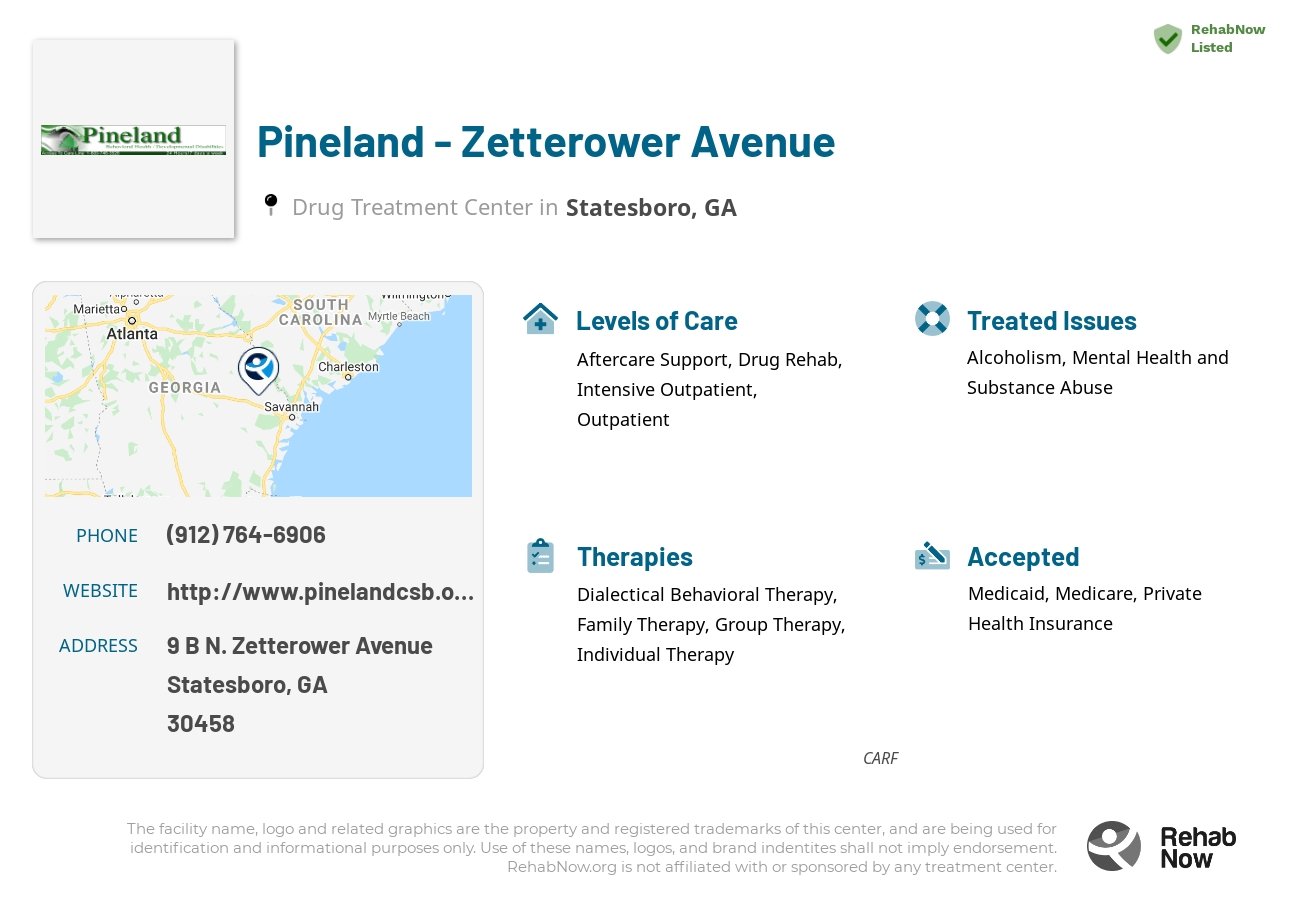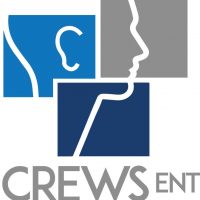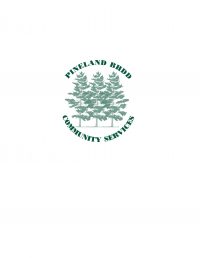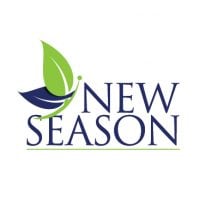Pineland - Zetterower Avenue
Drug Rehab Center in Statesboro, Georgia
Pineland - Zetterower Avenue is a full-service addiction and substance abuse treatment facility in Statesboro, Georgia, offering a wide range of services such as individual counseling, family therapy, medication-assisted treatment, and evidence-based therapies to help individuals manage their addiction and live a healthier life.
Multiple patients have reported Pineland - Zetterower Avenue as permanently closed.
Research other rehabs in Statesboro, Georgia, or get help finding an open facility.
About Pineland - Zetterower Avenue in Georgia
Pineland - Zetterower Avenue is a full-service addiction and substance abuse treatment facility located in Statesboro, Georgia. It is dedicated to helping individuals and families overcome substance abuse and addiction and offers a wide range of services to assist in recovery. These include individual counseling, family therapy, medication-assisted treatment (MAT), and an alcohol and drug education course. In addition, the facility provides 24-hour nursing care, inpatient and outpatient detoxification, aftercare, and relapse prevention services.
Pineland - Zetterower Avenue is committed to providing comprehensive care for its patients. They offer evidence-based therapies such as cognitive behavioral therapy and dialectical behavior therapy in order to help individuals develop the necessary skills to manage their addiction and live a healthier life. They also provide medication-assisted treatment to assist with cravings, withdrawal symptoms, and other medical issues. The facility also provides family services to help family members understand and cope with the addiction and its effects on their loved ones.
Pineland - Zetterower Avenue is fully licensed and accredited by The Joint Commission and holds numerous national awards for its comprehensive addiction treatment program. In addition, the facility is part of the Recovery Village network, which provides resources and support to individuals and families throughout the entire recovery process. This ensures that individuals receive the highest quality of care throughout their entire recovery journey.
Genders
Ages
Modality
Additional
Accreditations

CARF
The Commission on Accreditation of Rehabilitation Facilities (CARF) is a non-profit organization that specifically accredits rehab organizations. Founded in 1966, CARF's, mission is to help service providers like rehab facilities maintain high standards of care.
Conditions and Issues Treated
Some addicts can benefit from substance abuse treatment, which is designed to help them become and remain sober without the use of medications. These programs are typically used by those struggling with drugs like marijuana or hallucinogens. However, they might be beneficial for those with a co-occurring mental health disorder like schizophrenia, major depression or bipolar disorder.
During this type of treatment, the addict will meet with therapists and other professionals on a regular basis to learn coping skills and healthy ways to deal with their addiction and mental health disorder.
Treatment programs often combine medications with counseling, support groups and even medical services like those found in hospitals or doctor’s offices. There are also detoxification services that addicts can use to get sober and avoid severe withdrawal symptoms.
Opioids are a group of drugs that include substances such as heroin, morphine, and oxycodone. These drugs activate opioid receptors in the brain, which produce pleasurable feelings. Opioid addiction occurs when drugs are abused at increasing rates or increasing amounts because the body becomes tolerant of them.
Opioid addiction is typically diagnosed when drug abuse becomes a typical behavior that interferes with an individual’s ability to function daily. The use of the substance results in consequences like legal problems.
Treatment for opioid addiction varies depending on each individual’s needs. Some treatments focus on replacing opioids with other drugs that have similar effects of reducing withdrawal symptoms. Other treatments aim to reduce the risk of relapse by providing psychological support or using more natural methods.
A drug rehab center that uses Dual Diagnosis is more likely to be successful in rehabilitating a person. Dual diagnosis helps to identify and treat any co-occurring disorders. It is essential to screen for both addiction and any untreated mental health issues. A dual diagnosis gives rehab the means to treat addiction while restoring mental and emotional health.
About 70% of patients with drug addiction have at least one other psychiatric diagnosis. Fortunately, dual diagnosis treatment is a proven model that has been highly effective.
Levels of Care Offered
This center offers a variety of custom treatment tailored to individual recovery. Currently available are Aftercare Support, Detox, Drug Rehab, Dual-Diagnosis, Inpatient, Intensive Outpatient, Intervention, Outpatient, Residential, with additional therapies available as listed below.
Detox, or detoxification, is the method of weaning a person’s body from the toxic substance(s) they have abused. This is a slow process under medical supervision and one that should occur for almost all individuals. As detox can cause medical complications, it should always be performed by experienced medical professionals in a safe setting.
Inpatient rehab means you live there while your addiction or co-occurring disorder is treated. Prescribed medications are used along with counseling.
This type of rehabilitation provides a drug-free environment for people who struggle with chronic/long-term addiction (or their own home). Jobs or school can be put on hold until after the stay to focus solely on recovery.
An intensive outpatient program is usually the first phase of addiction treatment. It provides relief for those addicted, but not ready to commit to an inpatient setting. IOPs consist of a daily 3 to 5-hour program, and there is a required number of hours per week. The goal here is to teach patients healthy coping skills, such as stress management.
Outpatient programs offer a lower intensity level of addiction treatment than inpatient facilities. They are ideal for those who have graduated from inpatient facilities, have a supportive home environment, and are motivated to commit to the program. Services offered include medication-assisted treatment, individual and group therapy, and peer group support.
This treatment is a popular option for those suffering from a lower intensity addiction. It is not advisable for someone who needs to go through a medically supervised detox or does not have a supportive home environment. It requires motivation and dedication to commit to the program without constant monitoring.
Residential treatment programs are those that offer housing and meals in addition to substance abuse treatment. Rehab facilities that offer residential treatment allow patients to focus solely on recovery, in an environment totally separate from their lives. Some rehab centers specialize in short-term residential treatment (a few days to a week or two), while others solely provide treatment on a long-term basis (several weeks to months). Some offer both, and tailor treatment to the patient’s individual requirements.
Interventions help families and friends express their feelings, express their desire for change, and plan for action. Interventionists are trained professionals who help family members plan or lead interventions. Family members should help choose an experienced professional to guide their loved one through treatment. Across the country, intervention services are available.
Aftercare Support in drug rehab is crucial because it helps people stay sober after treatment. Aftercare Support in drug rehab is helpful because it provides the recovering person with a support group, including family members, friends, and other peers who are also in recovery.
The benefits of Aftercare Support are that it provides a pathway that will help people get sober for life. It supports healing at all levels, physical, mental, emotional, and spiritual. Another benefit of Aftercare Support is that participants learn to maintain their sobriety through holistic methods. They learn to modify behaviors individually to have peace of mind, have positive relationships with others, and find peace on the inside.
Therapies & Programs
During individual therapy at Pineland - Zetterower Avenue in , the person in recovery meets with a therapist one on one to go over their situation and learn from past mistakes. The counselor or therapist will use this time to address the causes of addiction, triggers, and any mental issue or dual diagnosis. They will also address aftercare plans, giving them the best chances of long-term sobriety.
This therapeutic process is very intense and challenging to go through. Some clients may find it easier to open up with someone apart from their family or loved ones who understand their struggles and experience with addiction.
Family therapy is designed to help addicts get clean and sober by using what they love the most; their family. Most drug treatment centers make it mandatory that the addict’s family attend therapy sessions, which is great because having everyone there to support them makes it much easier for them to get clean. Not only are they surrounded by people who want them to get better, but everyone is there because they want the best for them, not because they feel like they have to be.
Drug addicts are often surrounded by resentful or uneducated family members who would, at times, rather see them stay addicted because it makes their own lives easier. Sometimes they don’t understand what the addiction is or how they play a part in it. They know that during and after the addict’s sobriety journey, they will face challenges and changes that they aren’t sure how to handle. This can be very tough for an addict to go through on their own, which is why it’s so important that they have the support of their family. Just because someone is an addict does not mean that they don’t deserve the love and support of those around them.
Addicts in Statesboro, GA can find support in group therapy at Pineland - Zetterower Avenue by finding peers who understand their situation and being held accountable. They also learn to develop faith, understanding, and insight into their addiction through shared conversations.
Group Therapy is employed by drug treatment centers to provide the recovering addict with a platform to talk about their feelings and experiences. It also provides for an opportunity to learn from other addicts who have successfully overcome their addiction. It is recommended that all group members be recovering addicts for this type of therapy to work.
Dialectical behavior therapy (DBT) is a cognitive-behavioral therapy that focuses on eliminating specific negative thoughts, such as suicidal thoughts. These negative thoughts can potentially lead to an individual inflicting self-harm. It helps treat patients exhibiting uncontrollable emotions, intense mood swings, and borderline personality disorders.
The term “Dialectic” means the integration of opposites. In substance abuse, DBT refers to accepting the patient’s addiction and working to change their thoughts and behavior. It improves life skills such as controlling intense emotions without reacting impulsively, resolving interpersonal conflicts effectively, and promoting awareness about self and others.
Rational Emotive Behavior Therapy, or REBT, is a form of Cognitive Behavioral Therapy developed to help people overcome specific emotional and behavioral problems.The theory behind REBT is the belief that a person’s thinking (and resulting emotions) create their reality. By helping patients let go of certain ideas, they can reduce their feelings of anger and hostility and feel a sense of relief from rigid expectations. This, in turn, is believed to result in a reduction in both emotional and behavioral problems, impacting drug addiction.
Payment Options Accepted
For specific insurance or payment methods please contact us.
Is your insurance accepted?
Ask an expert, call (888) 674-0062
Additional Details
Specifics, location, and helpful extra information.
Statesboro, Georgia 30458 Phone Number(912) 764-6906 Meta DetailsUpdated November 25, 2023
Staff Verified
Pineland - Zetterower Avenue Patient Reviews
There are no reviews yet. Be the first one to write one.
Statesboro, Georgia Addiction Information
Prescription opioid use has caused a large increase in the total amount of overdoses in Georgia. Almost 12% of the Georgia population uses illicit drugs each year, and slightly over 3.5% also abuses alcohol at the same time. This does not include those who binge-drink at least once a month, which includes 20% of all Georgians.
In Statesboro, Georgia, drug addiction is a huge problem. According to 2016 statistics, there were 102 drug overdose deaths in Bryan County, which includes Statesboro. From 2013 to 2015, the number of overdose deaths from opioids increased by 139%. This means that the drug addiction problem in Statesboro is above the state average and is a cause for concern in the community.
Treatment in Nearby Cities
- Dahlonega, GA (191.9 mi.)
- Flowery Branch, GA (172.6 mi.)
- Ball Ground, GA (198.9 mi.)
- Stapleton, GA (66.4 mi.)
- Dublin, GA (66.0 mi.)
Centers near Pineland - Zetterower Avenue
The facility name, logo and brand are the property and registered trademarks of Pineland - Zetterower Avenue, and are being used for identification and informational purposes only. Use of these names, logos and brands shall not imply endorsement. RehabNow.org is not affiliated with or sponsored by Pineland - Zetterower Avenue.








